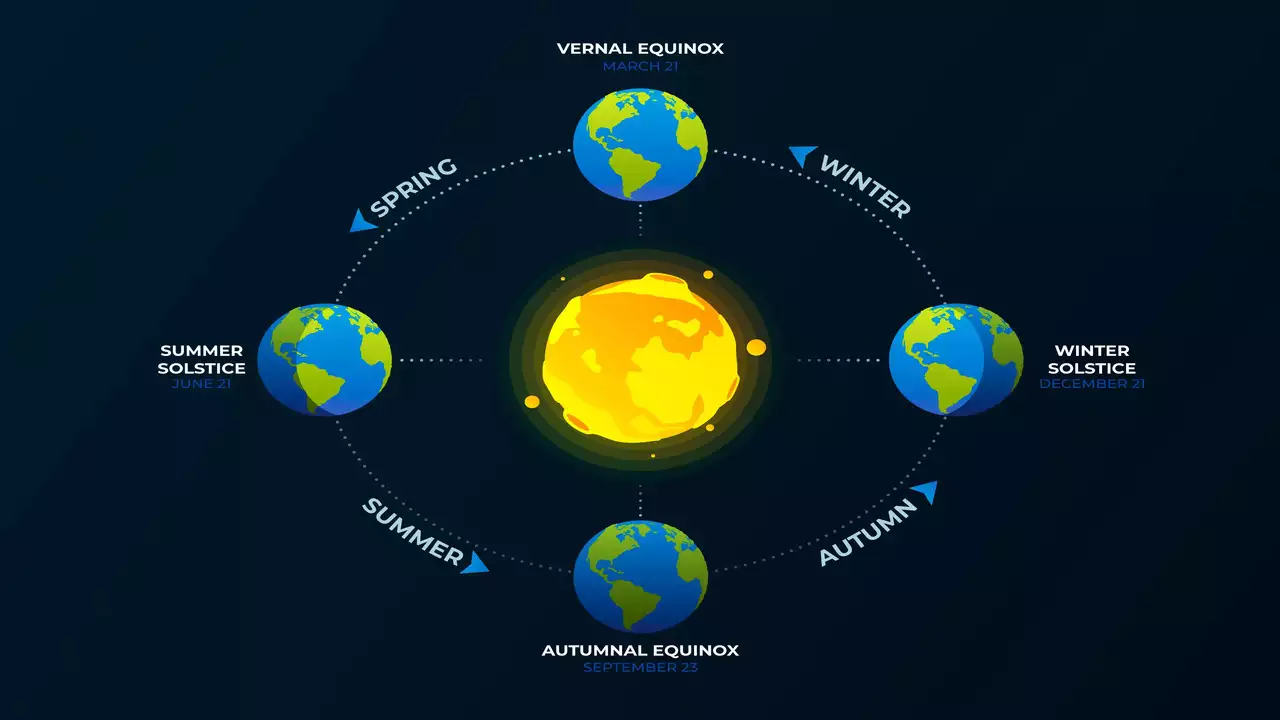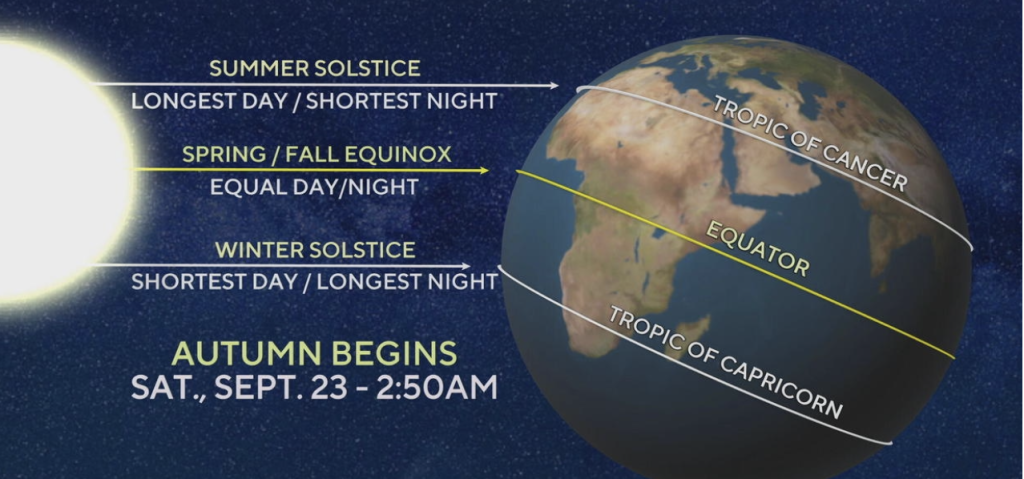Autumn Equinox 2023: What & When Is The First Day of Fall?
21st Sep 2023
In mid-September every year, we approach a celestial occurrence known as the Autumn Equinox. What is the nature and impact of this equinox on our world? This article will look into the phenomenon of the fall equinox, and explore its profound significance in our celestial calendar.
What is a Solar Equinox?
To understand the fall equinox, we first need to grasp the concept of a solar equinox. A solar equinox is when the Sun crosses the Earth’s equator, making it appear directly above the equator. This event occurs twice yearly, once in March (the vernal equinox) and once in September (the autumnal equinox).
The term “equinox” comes from Latin and means “equal night.” During an equinox, day and night are approximately the same length worldwide. This balance between light and dark gives the equinox its name and significance.
Are Day and Night Perfectly Equal on the Autumn Equinox?
Some say that during an equinox, day and night are equal. Well, not exactly. It depends on where you live. On the equinox, the centre of the Sun is indeed above the horizon for 12 hours. However, “sunrise” is said to begin when the upper edge of the Sun’s disk becomes visible above the horizon (which happens a bit before the centre rises) and ends when the entire Sun has set. In this regard, daylight is still a bit longer than nighttime.
Not only that, but the light of the Sun is visible when it is below the horizon, as Earth’s atmosphere refracts the Sun’s rays and bends them in an arc over the horizon. Yes, you can see the Sun before the edge actually reaches the horizon! This causes daylight to be longer than 12 hours as well.
However, they are very close to equal (the total lengths may differ by only a few minutes).
When is the autumn equinox 2023?

This year, the Autumn Equinox will begin on Saturday, 23rd September, at 2:50 a.m. and last until the Winter Solstice on Thursday, 21st December, at 10:27 a.m.
Why is 21st September called the fall equinox? While the September equinox usually occurs on 22nd or 23rd September, it can rarely fall on 21st or 24th September. A 21st September equinox has not happened for several millennia. In the 21st century, it will happen twice – in 2092 and 2096. The last 24th September equinox occurred in 1931. The next one will take place in 2303.
The equinox dates vary because of how the Gregorian calendar defines a year (365 days) and the time it takes for Earth to complete its orbit around the sun (about 365 and 1/4 days).
What Happens on the Autumnal Equinox?
The autumnal equinox is a captivating moment in the natural world. During this time, the Sun crosses the celestial equator from north to south. As a result, the Northern Hemisphere begins to tilt away from the Sun, leading to cooler temperatures and the stunning transformation of foliage into the rich, warm colours we associate with fall. In other words, it is the first day of Autumn. In the Southern Hemisphere, this event marks the onset of Spring.
The Harvest Moon & the Fall Equinox
One of our favourite pieces of trivia surrounding the autumnal equinox involves its relationship with the full Moon. Curiously, the full Moon nearest to the autumnal equinox is always called the ”Harvest Moon!” Why is that?
It has to do with farming! Around the fall equinox, the full Moon rises around sunset for several nights in a row, traditionally providing farmers with just enough extra light to finish their harvests before the killing hard frosts of fall set in.
Typically, the Moon rises a little under an hour later each night, but around the time of the fall equinox, the angle of the Moon’s orbit and the tilt of the Earth line up just right and cause the Moon to rise only about 20 to 30 minutes later each night for several nights in a row!
What is Special About the September Equinox?
The September equinox is particularly special because it signifies a pivotal point in the Earth’s annual journey around the Sun. It marks the official start of Autumn in the Northern Hemisphere and Spring in the Southern Hemisphere. Cultures around the world have celebrated this celestial event for centuries, recognizing its significance in the changing seasons.
Autumn Equinox Rituals and Celebrations
The Autumn Equinox has long been a time of celebration and reflection for various cultures. Here are some common rituals and ways people celebrate this special time:
- Harvest Festivals: Many cultures celebrate the bountiful harvests of the season. They come together to give thanks for the fruits of their labour and share in communal feasts.
- Nature Walks: Taking a leisurely stroll through the changing landscapes to admire the beauty of autumn is a simple yet profound way to connect with the season.
- Balancing Eggs: A quirky tradition in some places involves trying to balance an egg upright on a flat surface during the equinox. While it’s mostly a fun activity, some believe it symbolizes the balance between day and night.
- Pagan Traditions: Some pagans and Wiccans celebrate the equinox as Mabon, a time to honor the balance of light and darkness. They may perform rituals, create altars, and engage in meditation or divination.
- Reflection and Gratitude: As the season shifts, many individuals take this time to reflect on the year’s experiences and express gratitude for the abundance in their lives.
- Feast of Michaelmas: In some Christian traditions, the equinox is associated with the Feast of Michaelmas, which honours the archangel Michael. This feast typically involves special church services and seasonal foods.
The Autumn Equinox 2023 is more than just a date on the calendar. It’s a celestial event that signifies the transition from Summer to Autumn, a time of balance between day and night, and a cause for celebration. As we approach this year’s fall equinox, consider taking time to reflect on the balance in your life and the changing seasons around you.






Thank you for your comment! It will be visible on the site after moderation.